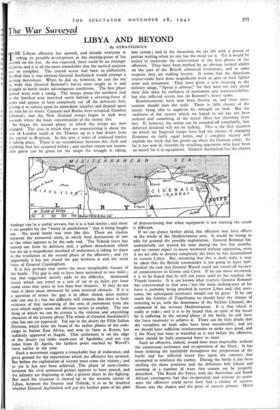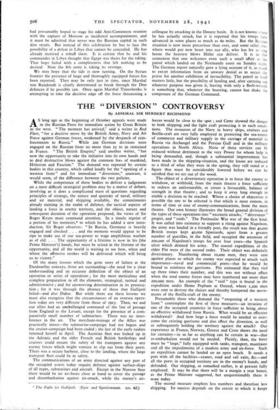a The War Surveyed
LIBYA AND BEYOND
By STRATEGICUS HE Libyan offensive has opened, and already everyone is T
taking its possible development as the starting-point of his outlook on the war. As was expected, there could be no strategic surprise, and it is all the more remarkable that the tactical surprise was so complete. The coastal sector had been so elaborately fortified that it was obvious General Auchinleck would attempt a turning movement. When he did so, however, he cast his net so wide that General Rommel's forces were caught in it and brought to battle under advantageous conditions. The first phase indeed went with a swing. The troops about the northern end of the fortified area marched north behind a covering-force of tanks and appear to have completely cut off the defensive belt, leaving it to subsist upon4its immediate supplies and depend upon the rain for its water. Capuzzo and Bardia were occupied, Gambut followed ; and the New Zealand troops began to look west towards where the main concentration of the enemy lies.
So began the second phase, in which the troops are now engaged. The area in which they are manoeuvring is about the size of London south of the Thames up to a line drawn from the capital to Brighton. In this area a series of confused battles is taking place. There is no resemblance between this clash and anything that has occurred before ; and neither reason nor reason- able guess can be given for the shape the struggle is taking.
Analogy can Se a useful servant, but it is a bad master ; and there is no parallel for the " battle of annihilation " that is being fought out. No naval battle was ever like this. There are clashes between the armoured units, in which final destruction of one or the other appears to be the only end. The Tobruk force has moved out from its defences and, a gallant detachment which has set up a magnificent standard of endurance, is taking its share in the resolution of the second phase of the offensive ; and yet apparently it has not closed the gap between it and the main force of General Cunningham.
It is this perhaps that seems the most inexplicable feature of the battle. - The gap is said to have been narrowed to two miles ; but that suggestion merely adds to the difficulty. Armoured forces which can travel at a rate of up to 35 miles per hour could cross that space in less than four minutes. If they do not close it there must obviously be some material obstacle. If it is a question of mines the gap is in effect closed, since neither side can use it ; but the difficulty still remains that there is little evidence of that narrowing of the area of movement from the west which might seem the obvious tactics to employ. The one thing of which we can be certain is the violence and unyielding character of the present phase. The whole of General Auchinleck's plan has not yet appeared. Far out in the desert the Fifth Indian Division, which bore the brunt of the earlier phases of the cam- paign in Italian East Africa, and won its fame at Keren, has suddenly appeared at Augila. This settlement is on the edge of the desert 125 miles south-east of Agedabia, and not 15o miles from El Ageila, the farthest point reached by Wavell's force earlier in the year.
Such a movement suggests a remarkable feat of endurance, and gives ground for the expectation which the offensive has aroused. But before the exploitation of victory must come the victory ; and as yet it has not been achieved. The phase of mass-clashes between the rival armoured groups appears to have passed, and the infantry are beginning to take a greater share in the fighting. But until the situation is cleared up in the western corner of Libya, between the frontier and Tobruk, it is to be doubted whether General Auchinleck will put the further parts of his plan
into action ; and in the meantime we are left with a period of patient waiting when no one has the mind for it. Yet it would be unjust to underrate the achievement of the first phases of the offensive. They have been marked by an obvious tactical ability on the part of the British armoured formations, and in some respects they are making history. It seems that the American cruiser-tanks have done magnificent work in spite of their lighter arms and armament. They have given a new meaning to the military adage, " Speed is armour," for they have not only saved their thin skins by swiftness of movement and manoeuvrability, but also inflicted severe loss on Rommel's heavy tanks.
Reinforcements have now been thrown in, and their inter- vention should turn the scale. There is little chance of the enemy being able to augment his strength on land. But the swiftness of the victory which we hoped to see has not been realised and something of the moral effect has therefore been lost. If, however, the action can be rounded-off completely, that deferred dividend will not be lacking. This is the first occasion on which the Imperial troops have had the chance of engaging Germans on fairly equal terms, and a complete victory will explode the myth that has grown up about the German army. So far it has won its victories by attacking opponents who have been no match for it in equipment. General Auchinleck has the chance
of demonstrating that when equipment is not wanting the result is differgnt.
If we can glance farther afield, this offensive may have effects in the whole of the Mediterranean area. It would be wrong to take for granted the possible exploitation. General Rommel has undoubtedly not wasted his time during the last few months, and we cannot expect to move westward without opposition, even if we are able to destroy completely the force he has accumulated in eastern Libya. But, assuming that this is dealt with, it may be taken that the British commander is not going to leave half- finished the task that General Wavell could not round-off because of commitments in Greece and Crete. If he can move westward, it is to be hoped that he will not pause until he has reached the Tripoli frontier. It is not known what reserves General Rommel has concentrated in that area ; but the main striking-part of his force is probably being attacked in eastern Libya and, that over- come, the subsequent resistance should not be great. If he can reach the frontier of Tripolitania he should have the chance of restoring to us, with the dominance of the Sicilian Channel, the command of the western Mediterranean. It is -that which is really at stake ; and it is to be hoped that, in spite of the losses he is suffering in the second phase of the battle, he. will have the force necessary to achieve it. There can be little doubt that the casualties on both sides have been considerable ; and yet we should have sufficient reinforcements to make ours good, and if the Navy has been as watchful as it was before the offensive, there should be little armoured force to meet.
Such an offensive, indeed, would have been impossible without the continuous assistance and co-operation of the Navy. It has been isolating the battlefield throughout the preparation of the battle and has inflicted heavy loss upon the convoys that attempted to reinforce the enemy. During the battle it has been shelling the shore positions and the defensive belt inland and assisting in a number of ways that cannot yet be properly described. The Royal Air Force, with the Australian and South African contingents, has also co-operated, and without its assist- ance the offensive could never have had a chance of success. Never was the chance and the prize of success greater. Hitler
had presumably hoped to stage his odd Anti-Comintern reunion with the capture of Moscow as incidental accompaniment, and it must be admitted that never was the Russian capital in such dire straits. But instead of this celebration he has to face the possibility of a defeat in Libya that cannot be concealed. He has already received a rebuff there. It is certain that he and his commander in Libya thought that Egypt was theirs for the taking. That hope failed with a completeness that left nothing to be desired. Now the 8th army is taking its revenge.
We may hope that the tide is now turning. On the Syrian frontier the presence of large and thoroughly equipped forces has been reported. They may be only just in time, since Marshal von Rundstedt is clearly determined to break through the Don defences if he possibly can. Once again Marshal Timoshenko is attempting to take the decisive edge off the force threatening a
colleague by attacking in the Donetz basin. It is not known v here he has actually struck, but it is reported that his troops have advanced in some places as much as 6o miles. But the Russian situation is now more precarious than ever, and some relief else- where would put new heart into our ally, who has for so iong borne the heaviest blows Hitler can deliver. It is in this connexion that one welcomes even such a small affair as the patrol which landed on the Normandy coast on Sunday night. The German report naturally gave a lying account of it, as much to extort information from an unwary denial as to secure the praise for another exhibition of invincibility. The patrol in itself matters little, but the possibility of landing and, after carrying out whatever purpose was given it, leaving with only a flesh-wound, is something that, whatever the boasting, cannot but shake the composure of the German Command.



























 Previous page
Previous page